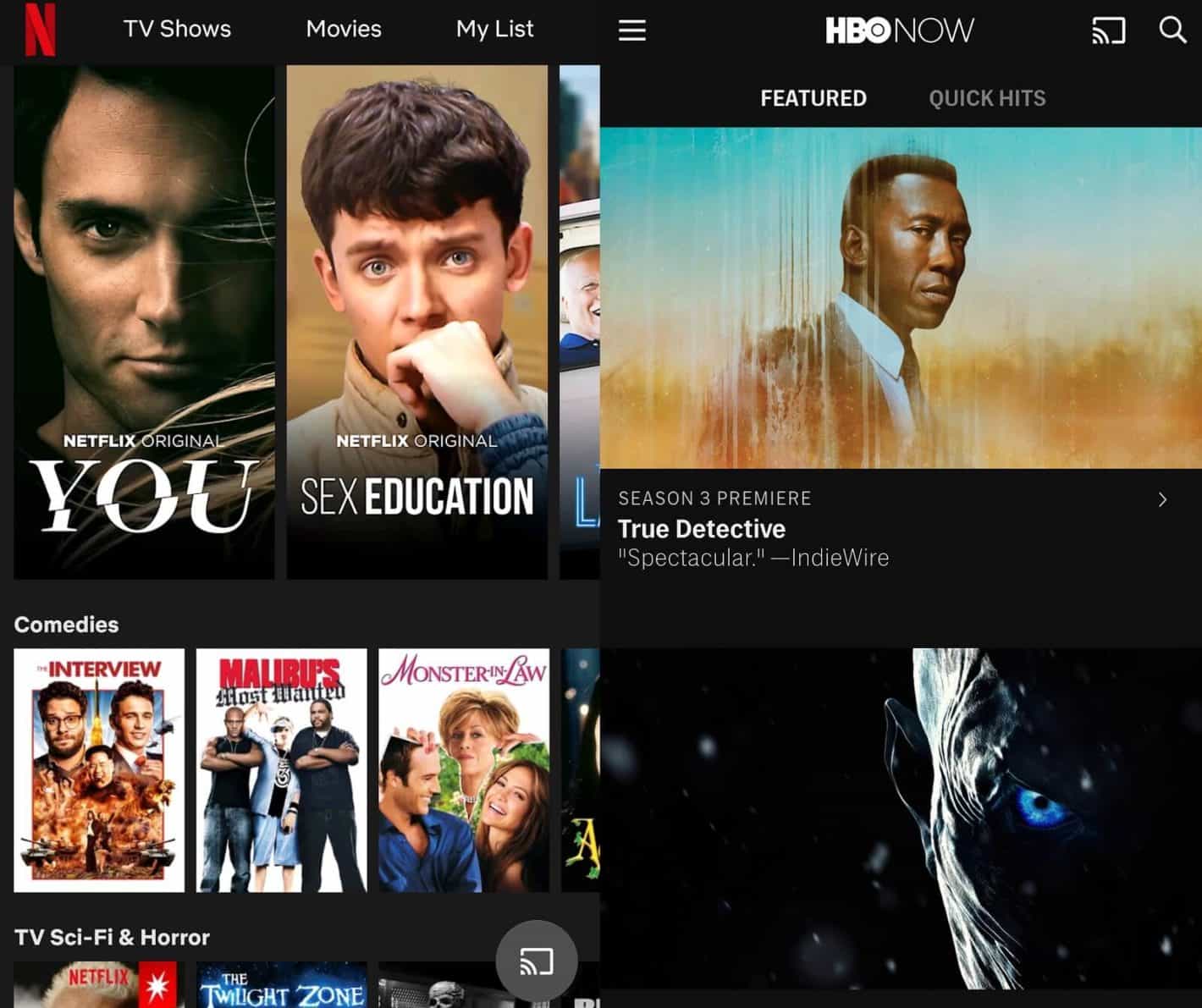Game of Thrones vs. Stranger Things? Which service should you go for?
Up until now, Netflix has always been compared to Hulu and/or Amazon Prime Video. To the point where most people likely make their subscription choice based on this comparison. In some cases, some people might flip between Hulu and Netflix on a monthly or quarterly basis depending on how much content they have consumed from one or the other at a given point.
Prime Video has, and for now always will remain an outlier here as this is typically consumed as part of a Prime membership and is not necessarily therefore an extra cost. But Hulu and Netflix definitely are.
Times they are a changin’
The reason Hulu and Netflix have typically always been compared against each other is the price. Both have largely been considered ‘up to $10’ entities as you can gain access to either for less than $10 and up the quality of the experience by upping the monthly cost.
HBO on the other hand has always been considered more of a premium purchase especially considering it costs $15 per month, as an add-on or standalone purchase.
But the times are indeed changing and Netflix announced this week that it is now upping the price for subscribers in the US. In fact, if you are not an active Netflix subscriber you will be charged the higher rate right now. Which for a Standard subscription (the one most people opt for) results in a monthly cost of $12.99 in the US.
Yes, Hulu charges $11.99 for its no-add option but you can opt for the $7.99 option – besides the ads there’s not much difference between the two plans (number of streams, playback quality and so on). Not to mention Hulu (No Ads) does still come with some ads due to content agreements. Adding to this, at times, you can get the ad-supported version for much cheaper. For example, Hulu for the last few months was offering the entry-level option for just $5.99. So yes, Hulu on paper costs $11.99, but you shouldn’t be paying that for Hulu in the first place. There’s no argument on that point, Netflix is the better option.
Hulu is not worth $11.99 per month.
Netflix on the other hand offers an entry level option (with the new price increase it’s now $8.99 per month) but drops the number of streams to one at a time and the quality down to SD. The very fact that most Netflix users are on the Standard plan can be argued is the Netflix plan. Now, however, at $12.99 the Netflix cost feels much closer to the cost for HBO than for Hulu, and that suddenly makes purchasing decisions far more interesting. As it remains to be seen whether Netflix is worth the money when you could opt for HBO instead.
The quantity argument
If your decision strictly comes down to quantity then Netflix is your best option. Netflix offers more content than HBO on any given day. So if you want ‘quantity value for money’ then Netflix will win out. Always.
This also applies to the network’s own content. Netflix has been greenlighting and releasing far more of its own content than HBO has. This is one of the reasons why Netflix did as well as it did last year at the Emmy’s compared to HBO. More shows means more nominations and that strategy paid off for Netflix gaining 112 noms compared to HBO’s 108.
So there’s more to watch on Netflix, and more of the content that you can only watch through Netflix on Netflix. Although a point to note about Netflix’s “Originals” is not all of its so-called original content is Netflix content. As the streaming service has a habit of branding a show/movie as a “Netflix Original” even though Netflix did not make the show.
The discrepancy here lies in distribution as Netflix often buys the rights to shows (usually imports) and then brands them to the US market as if the show was its own. One of the most recent examples of this was “Bodyguard.” This is a UK show greenlit and paid for by the BBC and Netflix agreed the rights after it had proved successful in the UK.
While there’s nothing wrong with Netflix branding content as “Original” — as it is the only place you can currently watch the content in the US — that’s not quite the same as believing the show is a Netflix show, always will be a Netflix show, and will always remain only available through Netflix.
The quality argument
There’s no doubt the quality of Netflix’s own shows has increased massively of late. It really has. You only have to look at the likes of The Haunting of Hill House, You, and Bird Box to see how good its shows and movies now are.
One of the reasons for this is Netflix is willing to bet on scripts other networks might not. Whether that be because they are a little different, obscure or from an unknown writer, Netflix is willing to back more new content to build out its portfolio than any other network. Netflix is understood to be able to do this due to its unique approach to agreeing terms. For example, Netflix seems to be more keen on paying for the rights to original content, making it, and then collecting more back when it proves successful. So higher outlay, but greater return.
Other networks usually prefer to back content that they expect to see returns on. This also means those networks pay less up front to writers but give them more of a share if a movie/show is successful. Less outlay up front, less loss if the show/movie fails, but less returns.
Coming to HBO, and this network is very different to Netflix as it has always pushed forward a ‘less is more’ mantra. To the point where HBO likes to brand itself as a curated network. This means less shows, but shows that are of a higher quality in general.
So in spite of the upping of the quality of Netflix content, it could be easily argued that HBO shows are better value for money when it comes to the quality considering most of its content is of a minimal quality – unlike most of the content available on Netflix. You only have to look at the Emmy’s again to further highlight this point as while Netflix won the nomination war (112 vs. 108), when it came to Emmy wins, things were not so straightforward.
Netflix and HBO tied when it came to Emmy wins on 23 awards each.
While some might argue that proves Netflix quality is as good as HBO’s, there’s two points to note here. Firstly, HBO won the same amount as Emmy’s with less nominations and less content in general. Secondly, what is arguably the Emmy held in the highest regards is the Outstanding Drama Series award. This was won by HBO for Game of Thrones. Beating out Netflix’s two contenders in this category (Stranger Things and The Crown) as well as its own Westworld – which by the way was also another example of the quality shows HBO is capable of.
So overall there’s less filler on HBO and that is likely to be an important point to note for some. Whether you view success or recommendations based on critical acclaim or social media hype HBO offers as much as Netflix does, if not more, with less content thrown at you.
The newer argument
Another element to consider is third-party content. As while Netflix is collecting some great titles and branding them as its own, the selection of newer content is far more limited on Netflix compared to HBO. This is especially in true in terms of movies which seem to take an age to arrive on Netflix’s platform.
In contrast, HBO is already offering tiles including Ocean’s 8, Super Troopers 2, Life of the Party, Blockers, Rampage, Ready Player One, and more. All of which are 2018 movies.
So if accessing newer movies and shows from various networks and studios matters to you, then arguably HBO is the better option. As you will get a greater variety of theater releases quicker than you will by subscribing to Netflix.
The future matters
Whether you hedge on the quality or quantity side, what’s right for you now, might not be right for you in the future. Take Netflix for example. If you have been under the impression the non-Netflix content has gotten smaller in recent years. You would probably be right as this is Netflix’s end goal.
Netflix is intent on populating its service with its own content. That’s its priority now and in the future, with the intention that in the future the service will pretty much only offer its own content (made or purchased).
This also means that Netflix will be focusing less on third-party content in general and that is already starting to become evident. Users should expect to see less new content that’s not marketed as Netflix content, and less content overall as time goes on. One of the big examples of this was the near-miss that was Friends. It seemed Netflix was not planning on renewing the rights but eventually buckled under user pressure. Don’t expect this to always be the case.
This is the main issue Netflix, and its users, will likely face going forward as the streaming service looks to transition itself to solely a provider of content and not a licensee without compromising on the features and content that drew viewers to the service in droves. That is, while also continuously raising its prices to help pay for that transition.
Of course, you could always live your best life and subscribe to both. Although at close to $30 per month, for just those two channels, that’s unlikely to be a sensible option for many.
 Newsletter
Newsletter

